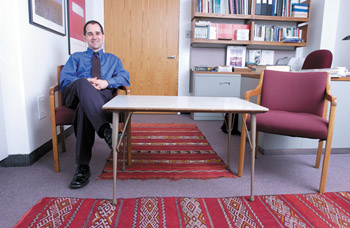 Investigations
Investigations
Spoon-feeding
anorexics
For the parents of a teenager with anorexia
nervosa-an eating disorder that strikes 1 to 2 percent of American women and has
one of the highest death rates of any mental-health condition-being told to have
a family picnic can seem like strange counsel.
No
carefree Sunday outing, this family meal takes place on a small table in the office
of Daniel le Grange, assistant professor of psychiatry at Chicago's Pritzker School
of Medicine. All family members, including siblings, must attend. The parents
are told to bring ordinary food to help their daughter-in almost all cases the
anorexic is female-regain weight.
 |
Daniel
le Grange sits at the picnic table for anorexic girls' families, whose mealtime
habits he scrutinizes.
Photo by Dan Dry |
Some
families arrive with filling, high-fat dishes-nourishment the starving adolescent
needs. Others bring sandwiches or take-out for themselves and for their daughter
a separate, ultra low-cal meal-a sign that the parents "collude with the
illness," le Grange says. Still others bring multicourse, gourmet feasts
prepared by the anorexic girl, who refuses to eat.
Le
Grange, who does not partake in the meal, asks about the food: where it was purchased,
who prepared it, if it's the family's usual fare. At the same time he observes
how they interact: does the mother urge her daughter to take one more bite, while
the father takes his daughter's side? Does the son nag or inform on his sister?
Afterward le Grange talks frankly with the family-including the anorexic-about
what behaviors to change. His goal is to train the parents to act as a noncritical,
sympathetic tag team whose task is to cajole the girl into eating enough high-calorie
food to reverse her starvation. Siblings learn to offer moral support rather than
act like small parents.
This method, called the
"Maudsley approach" and pioneered by Christopher Dare and Ivan Eisler
at the University of London's Maudsley Hospital, contradicts more than a century
of thinking about the family's role in eating disorders. In 1873, when British
physician Sir William Gull first named anorexia nervosa, he advised feeding
patients regularly but warned that family members were "generally the worst
attendants." French doctor Jean-Martin Charcot, who independently discovered
anorexie hysterique the same year, went even further and suggested socially
isolating patients. By the 1950s, toxic families-domineering mothers, overcritical
fathers-were blamed entirely for the illness, a theory that sounds plausible but
lacks clinical evidence: "We don't know what causes eating disorders,"
le Grange says.
While the Maudsley approach often
is described as controversial, "most parents don't think it's controversial
at all," notes le Grange, a South African who studied with Dare and Eisler
while earning his Ph.D. in psychology at the University of London. "What
we're telling them to do is what most parents do well-feed their children."
In
academic circles, however, family-based therapy has been criticized for giving
parents a license to control. "Nothing could be further from the truth,"
counters le Grange. "It's the eating disorder that controls the adolescent."
For anorexics, eating is an ordeal: patients obsessively calculate and recalculate
calories or refuse to eat unless food is arranged in a certain pattern. Parents
can end this obsession by temporarily revoking their daughter's responsibility
for choosing to eat. When she begins to gain weight she regains her ability to
make healthy choices because, le Grange says, "obsessive thoughts and feelings
are side effects of the starvation."
Compared
to other treatments, care under the Maudsley approach is astonishingly brief:
just 20 sessions over six months, with the family meal usually scheduled for the
second session. In other meetings the family discusses the daughter's progress.
Le Grange doesn't address body-image issues, he says, because the therapy works
without it. Once the adolescent begins to gain weight, he argues, those issues
disappear. At the end of the therapy he and the family talk about adolescent issues,
reintegrating the patient into the world of normal adolescent socializing and
concerns.
Recent evidence indicates that the approach
works. A 1997 study by Eisler, Dare, le Grange, and others found that after five
years, more than 80 percent of adolescent patients recovered completely with no
further treatment. The key is to catch the illness early, le Grange says, when
patients are in their teens and still live at home. "I use the analogy to
cancer," he says. "It's like a tumor that's malignant, but it hasn't
metastasized."
Le Grange, who joined the
U of C in 1998, is one year into a five-year study funded by the National Institute
of Mental Health to evaluate the Maudsley approach's effectiveness on 90 adolescents
with bulimia nervosa, an eating disorder characterized by binging and purging.
Because the desire to purge subsides after a few hours, the parents might watch
a movie with their daughter after a meal or even accompany her to the bathroom-"just
like nurses would in an in-patient unit," le Grange explains. "It may
seem very intrusive, but the intervention has to be more powerful than the illness
for it to have any effect."
Le Grange is
adapting his treatment manual for family-based anorexia therapists (Guilford Press,
2001) into a parents' guide, If Your Child Has an Eating Disorder, to be
published next year. He hopes it will replace books that rehash terrible advice,
such as "don't talk about food."
"How
can you not talk about food," he asks, "when your daughter is starving?"
- Carrie
Golus, AB'91, AM'93


![]() Contact
Contact
![]() About
the Magazine
About
the Magazine ![]() Alumni
Gateway
Alumni
Gateway ![]() Alumni
Directory
Alumni
Directory ![]() UChicago
UChicago![]() ©2002 The University
of Chicago® Magazine
©2002 The University
of Chicago® Magazine ![]() 5801 South Ellis Ave., Chicago, IL 60637
5801 South Ellis Ave., Chicago, IL 60637![]() fax: 773/702-0495
fax: 773/702-0495 ![]() uchicago-magazine@uchicago.edu
uchicago-magazine@uchicago.edu
